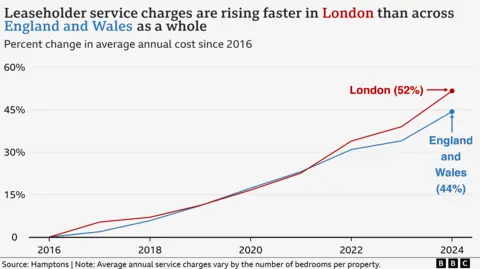 BBC
BBCIn 2016, Michele McInroy was overjoyed to pick up the keys to her new home – a two-bedroom flat in a refurbished building in Woolwich, south London. But her joy soon soured.
Communal areas were neglected, lifts didn’t work and repairs went unfixed, Michele says. Earlier this year, her service charge increased to around £10,000 a year, marking a 320% rise in five years.
Michele, who works as a civil servant, hopes to move from the capital to Dundee to be closer to her grandson but she is struggling to sell the flat. “I’m losing time that I could be spending with my family that’s really precious to me,” she says.
“I just feel trapped and there is absolutely nothing I can do.”
Across England and Wales, other homeowners are telling similar stories, as annual service charges have risen significantly. The average is currently £2,321, up 44% since 2016, according to estate agent Hamptons. In London it’s £2,500, marking a 52% increase in the same period.
Others I have spoken to say their service charges have increased by 400-500% in that time.

Among them is Gaz Rahman, whose annual service charge for his flat in the London borough of Tower Hamlets hit £4,654 in 2024, up from £960 five years earlier. “There’s no accountability,” he argues. “It just doesn’t add up.”
Sue Robertson, who owns a one-bedroom flat in West Sussex, reports that her service charge has shot up by 320% since 2019 – from £750 to £3,198 a year.
Some leaseholders have opened up about the devastating effect of these costs on their lives – among them are cases of bankruptcy, pressure on relationships and mental health. Sue Robertson tells me that she was hospitalised after attempting suicide. The financial pressure was, she says, a major factor. “Everything just got too much for me.”
For years, politicians have said they planned to address this issue. Then, last week, the current government committed to abolishing leasehold. Housing minister Matthew Pennycook said in a statement that there will be a consultation and white paper early next year – but for some this has come too late.
And the question that remains is, how did it reach a point where the Government needed to intervene?

Part of the problem is that this is an archaic system, based on principles dating back to the feudal days of landowners and tenants. Under the current system, leaseholders have to pay charges to a freeholder for services, including the maintenance and repair of communal areas and buildings insurance. Often a managing agent is appointed by the freeholder.
The vague language in the current law adds to the confusion. The law simply states that service charges must be “reasonable” and that where costs relate to work or services, they must be of a “reasonable” standard.
But campaigners in the field argue that there is another issue at play: that is, unscrupulous freeholders and managing agents exploiting the system.
“Exploitation in broad daylight”
As Sebastian O’Kelly, chief executive of the Leasehold Knowledge Partnership, puts it: investors cottoned on to the fact they could make money out of the boom in newbuild apartment blocks that have sprung up across the country over the last 25 years.
Previously most freeholders were local authorities or landowners but the boom has led to investors – including venture capital, pension funds and even charities – getting involved. Income from ground rents and lease extensions as well as the rising value of the land itself all make this lucrative.
“We’re talking about a multi-billion pound property sector.” He argues that leaseholders are at the mercy of companies who are “just there to make money out of them”.
In a recent investigation, the BBC examined about 140 tribunals relating to one London-based firm, Assethold, and discovered that judges have assessed it to have overcharged homeowners by a combined sum of nearly £1.2m. Assethold said it was “actively reviewing findings from past tribunal decisions” and had implemented changes where necessary.
But the BBC has seen complaints about other companies accused of overcharging leaseholders too. The problem with policing this is that anyone can buy a freehold and anyone can set themselves up as a managing agent.
“There are still thousands of people being exploited,” says Sir Peter Bottomley, former Father of the House of Commons and a campaigner against the leasehold system. “The stories that have come to me in my last 15, 20 years in Parliament would make most people weep.” He says that these include numerous stories of leaseholders being exploited by freeholders.
“And it’s been happening in broad daylight.”

He also argues that it is “often the young and less well-off who are being lumbered with costs they cannot afford, in ways which are unjustified”.
The Residential Freehold Association (RFA), which represents the largest freeholders in the country, strongly disagrees that the system is “exploitative” but says it has “called for improvements to the home buying and selling process” so that leaseholders understand their obligations.
Questions around transparency
Large newbuild estates and buildings can be complex and expensive to maintain, but a concern among some is the lack of transparency. Leaseholders have complained about hefty bills with little detail or unexplained demands for eye-wateringly high sums.
The Leasehold Advisory Service says that of the 33,000 people have gone to them for advice in the last five years, it has received more complaints about service charges than any other subject.
However, industry insiders argue that there are legitimate reasons for rising charges, including the repercussions of the Covid-19 pandemic, as well as the fallout from Brexit.
“We have seen significant inflation in recent years, as well as extensive material cost increases following the Covid pandemic. This ultimately translates into higher service charges,” the RFA said in a statement.
Jaclyn Mangaroo of the Property Institute, a professional body that represents managing agents in England and Wales, is among those arguing that Brexit triggered an increase in costs. Indeed some say exiting the EU has led to labour shortages in the industry.
Mrs Mangaroo also points out that the Grenfell fire tragedy has seen insurance charges rise, which in turn pushed up service charges.
However her organisation wants managing agents to be regulated to prevent what she calls “abuse” of the system. Its members are properly trained, she stresses, “but there is no oversight or accountability for those outside the membership, for everybody else that’s operating”.
Last week the housing minister has announced they would regulate managing agents but added they need to consult on this first.
Labour’s new plans
Abolishing leasehold for flats was not included in the Leasehold and Freehold Reform Act 2024. Ultimately, the Conservative government ran out of time to get everything it wanted into the legislation before Rishi Sunak called the general election.
The legislation that passed did include some gains for leaseholders, such as giving them more power to buy their freehold. Now, however, certain elements of the previous government’s plans that never made into law will be taken forward by Labour, including making it easier for residents to acquire “the right to manage”. (In other words, they will still have a freeholder but can take over the management of their building.)
However, the RFA says its studies show that “self-management looks to make no difference” to service charge costs.
After Scotland abolished leasehold two decades ago, it introduced the commonhold system where residents own the building and a factor (a type of property agent) maintains the common areas of buildings on their behalf. Unlike managing agents in England, factors must be registered.
Commonhold has been an option in England and Wales since it was introduced under Tony Blair’s government in 2002, but the tenure has not caught on – it applies in only 1% of properties in England and Wales.
Then, last week, Pennycook announced that commonhold would be made “the default tenure,” as part of the wider plan to abolish leasehold, but this will all take time to get right. The prime minister reiterated this in a radio interview .
Katie Kendrick, founder of the National Leasehold Campaign (NLC), believes that commonhold is the right way forward. “[It means] the flat owners all have a vested interest in getting best value for money on service charges.”
But the RFA warns that commonhold isn’t a “silver bullet”. Sometimes, not all residents in a building agree to work going ahead, which can slow down repairs or prevent them happening at all, they say.
Fightback from landowners
Whatever happens next, it won’t be easy. Landowners have power and deep pockets and they’re prepared to fight for the land. A group of major freeholders are bringing a legal challenge under the Human Rights Act over proposed changes to the calculation used to compensate landowners when leases are extended.
Henry Hill of the ConservativeHome website is sceptical that any government will ever be able to successfully take on all those with a vested interest in preserving leasehold. “We’re talking tens of billions, hundreds of billions maybe worth of value, unless the government was prepared to try and just take that without compensation, which in our current legal regime would be impossible,” he says.
“Formally abolishing leasehold is not going to happen.“
However, Sebastian O’Kelly is hopeful. “Labour needs to get it finished,” he says.
Labour has said it will indeed get it finished and it is “switching on” some of the legislation that the Conservatives bought in. In addition, they are drafting another bill that will go further.
In the meantime, however, frustration is still growing among many leaseholders, as this all requires more waiting.
And according to Suzanne Muna from the Social Housing Action Campaign (SHAC), “people are getting organised”, with members going on service charge strike and refusing to pay soaring bills. It is a risky move, as under lease conditions, it can leave leaseholders at risk of losing their home.

Some, however, have successfully challenged their service charges. Property lawyer Keeley Livingstone, from Essex, says she was able to save £140,000 for her and her neighbours, after spending more than 100 hours examining their bills and pointing to the freeholder where they had been overcharged.
“There were a few things on there that just didn’t look right,” she says. “We have a concierge and security. I questioned that because [the bill] was so high, and we don’t see half of these people. That was removed – £98,000 worth.”
But other, like Michele, still feel stuck. “I have absolutely no power,” she says. “I want to sell my flat and I cannot.”
She says that Pennycook, who is her local MP, seemed sympathetic to her situation when she and her neighbours raised it with him. Whether he can change their particular situation – and that of thousands of others – remains to be seen.
“I would never buy a leasehold again,” says Michele. “Landlords have too much power. The management company has too much power. It should be equal, and it’s not.”
Additional reporting by Lauren Stanley
BBC InDepth is the new home on the website and app for the best analysis and expertise from our top journalists. Under a distinctive new brand, we’ll bring you fresh perspectives that challenge assumptions, and deep reporting on the biggest issues to help you make sense of a complex world. And we’ll be showcasing thought-provoking content from across BBC Sounds and iPlayer too. We’re starting small but thinking big, and we want to know what you think – you can send us your feedback by clicking on the button below.

